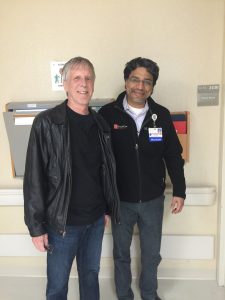Peoria man donates kidney to stranger
By Amy Morys For Chronicle Media — April 26, 2016
Outside OSF Saint Francis Medical Center, Stephen Heinemann stands with his transplant surgeon, Dr. Manish Gupta.
While most folks spent last Dec. 21 bustling about, perhaps shopping for last minute gifts or attending holiday parties, Stephen Heinemann checked in to OSF Saint Francis Medical Center to donate a kidney – to a complete stranger.
When a friend of his wife became ill and required a kidney transplant, Heinemann volunteered to undergo the donor qualification process. Although he was not found to be a compatible match for the friend, his experience led to the donation that occurred many months later.
In Heinemann’s estimation, the benefits of his donation far outweighed the risks, allowing him to confidently move forward with the donation process.
“Mary (his wife) and I discussed this thoroughly; other family members offered their input, but all agreed that the decision was ours to make,” Heinemann said. “We decided that the risk was sufficiently low to be worth taking … and that potential benefits would be well worth the commitment on our part.”
Heinemann’s process began in March of 2015, nine months before the surgery took place. He explained that life-sustaining options, such as dialysis, allow the kidney donation and transplant process to move forward thoughtfully, ensuring the greatest possibility for donation and transplant success.
The matter of donating to a stranger was inconsequential to Heinemann.
“We met before the surgery, after the match had been established and the surgery scheduled,” he said. “We spoke again at the hospital after the surgery had been completed. He actually was discharged after the transplant before I was, which is typical for the procedure. We have met socially since then, and expect to do that again.”
Crediting the professional staff and OSF Saint Francis Medical Center’s transplant program’s high record of success, Heinemann noted that he went into the procedure feeling confident and fully prepared.
“They were forthright, in every respect,” he said. “Trust in the surgeons and their staff is essential; my experience was that this trust was completely merited.”
This kind of sacrifice not only affects the donor, it requires a significant commitment from family as well.
“Organ donation is an unusual procedure,” he said. “Since you enter the hospital healthy, you leave in worse shape than when you entered — still healthy, essentially, but as someone who has recently undergone surgery.
“Preparation for all aspects was excellent. My family was wonderfully supportive, particularly my wife (Mary), who was responsible for much of my care following the surgery. She took this on willingly and lovingly, and I will always be grateful to her for that, as for so much else.”
A Professor of Music at Bradley University, Heinemann’s surgery and recovery time had to be completed during the six-week winter break, allowing him to return in time to begin the spring semester.
The procedure went smoothly and recovery time was completed on schedule.
“The physical recovery was slightly more difficult than I had hoped, but completely in line with what I had been told to expect,” he said. “Now, four months after the procedure, I feel completely healed and have been doing fine. In fact, I was nearly at full strength when our spring semester classes began, a month after my surgery.”
Encouraging those considering a donation, Heinemann says he hasn’t had to give up anything nor is he physically limited in any way as a result of the surgery.
While many consider this selfless sacrifice heroic, Heinemann doesn’t see it that way.
“Emotionally, one of the surprising aspects was the necessity of learning to respond to people’s praise,” he said. “I simply thought of the procedure as being the right and appropriate thing to do, and don’t consider it to be an act of altruism, as some have described it. I was simply in the right place at the right time. I don’t regard myself as particularly brave, and am quite sure that I would not have gone through the process if I had felt endangered by it.”
According to The United Network for Organ Sharing, more than 100,000 Americans are awaiting a kidney transplant. For more information on becoming a donor, contact a living donation coordinator at OSF Saint Francis Medical Center by dialing (309) 655-4101.
April is National Donate Life Month, dedicated to celebrating the generosity of those who have saved lives by becoming organ, tissue, marrow and blood donors.
— Peoria man donates kidney to stranger —



